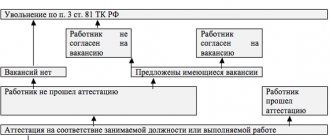Termination of a contract and unilateral refusal to perform it: distinguish, not mix
knows the institution of termination of a contract and knows the institution of unilateral refusal to fulfill it. A certain similarity (both serve the stage of termination of the contract, the rules on refusal refer to the provisions on termination) sometimes forces the parties to mix them up, as a result of which civilized freaks are born - products of interspecies crossing: “unilateral termination of the contract”, “unilateral termination of the contract "and even "unilateral, early unmotivated termination of the contract." The question arises about the ethics of such experiments on civil law institutions, especially since their results can spoil a lot of blood for both their creators and innocent practicing lawyers. Let's start with the fact that no “unilateral termination of the contract” is possible.
It is terminated either by mutual agreement of the parties, or by the court on the initiative of one of them. In the second case, the initiative is not equal to some kind of “unilateralism”; the process of termination cannot be resolved by the exclusive will of the person who came up with such an initiative - an intermediary link in the form of a counterparty or a court is always necessary (it would be strange if a court with a demand for termination should both/all parties to the contract were contacted).
In order for a party to a contract to be able to voluntarily withdraw from the contract, it must have the right to unilaterally refuse to perform it, implemented by addressing the corresponding expression of will to the counterparties. In most cases, attempts to cross crucian carp with piglet mean that the parties tried to establish some kind of preferential ( compared to the established code) unilateral withdrawal regime from the treaty, but were unable to adequately express this in the text of the treaty. The low quality of contract work is, of course, facilitated by the fact that at the level of medium-sized businesses and below it is carried out according to the principle
“let’s sign everything as soon as possible, and then we’ll sort it out”
. This is aggravated by the fact that such confusion is also allowed by the legislator (see.
, Federal Law No. 137-FZ of October 25, 2001)
On the consequences of termination of the contract
Author: · 01/01/2015 The Resolution of the Plenum of the Supreme Arbitration Court of the Russian Federation dated 06/06/2014 N 35 (hereinafter referred to as Resolution N 35) provides clarifications to arbitration courts in order to ensure a uniform approach to resolving issues related to the termination of contracts. According to Art. 450 of the Civil Code of the Russian Federation, a contract can be terminated by agreement of the parties or by a court decision. Unilateral refusal to fulfill an obligation and unilateral change of its terms are not allowed, except in cases provided for by law (Art.
310 of the Civil Code of the Russian Federation). Based on clause 3 of Art.
450 of the Civil Code of the Russian Federation in the event of a unilateral refusal to fulfill the contract in whole or in part, when such refusal is permitted by law or by agreement of the parties, the contract is considered respectively terminated or amended.
Based on these norms, the Plenum of the Supreme Arbitration Court came to the conclusion that a unilateral refusal to fulfill a contract, when such refusal is permitted by law or by agreement of the parties, entails the same consequences as termination of a contract by agreement of its parties or by a court decision. These consequences are subject to application of the legal positions formulated in Resolution No. 35. As an example, let us cite Resolution of the Federal Antimonopoly Service No. F03-2771/2014 dated July 28, 2014, which considered a dispute over a lease agreement.
The tenant has not paid rent under the contract for more than two months in a row. The landlord sent him a notice of termination of the contract. The tenant, disagreeing with this, went to court.
From the contents of Art. 619 of the Civil Code of the Russian Federation it follows that, at the request of the lessor, the lease agreement can be terminated early by the court in cases where the tenant fails to pay the rent more than twice in a row after the expiration of the payment period established by the agreement. The landlord has the right to demand early termination of the contract only after sending the tenant a written warning about the need to fulfill his obligation within a reasonable time. The judges of the Federal Antimonopoly Service of the Far Eastern Military District, having established the failure of the tenant to pay rent for more than two months in a row during the validity of the agreement and the direction of the landlord
Letter of offer to terminate the contract
Let us consider from the beginning the procedure for terminating a contract by agreement of the parties. It must begin with a letter addressed to the counterparty. It can be drawn up in one of the options below, depending on whether the law allows unilateral refusal to fulfill an obligation under such an agreement.
The usual offer to negotiate and terminate the contract
One of them is one in which the letter contains a simple proposal to reach a mutual agreement. An approximate wording of such a letter can be seen in the corresponding section of our article Termination of a contract by agreement of the parties in accordance with the Civil Code of the Russian Federation. When drawing up and sending such a document, one should take into account the absence of legal consequences in the event of a negative answer or silence of its recipient.
We recommend that you immediately attach an agreement to terminate the contract to such a letter.
Sample agreement to terminate the contract Read more
Formal letter for subsequent application to court
In the second case, the requirement is based on a rule of law (Articles 451, 620 of the Civil Code of the Russian Federation) or an agreement. Examples of such letters are in the articles Letter on termination of a lease agreement - sample, Drawing up a letter on termination of a lease - sample. It is necessary to note that the procedure provided for by law (Article 452 of the Civil Code of the Russian Federation) implies the filing of a corresponding claim after sending a letter of offer. There is no automatic termination. For example, in their wording of the contractual terms, the parties in the above-mentioned case No. A08-7981/2013 implied the possibility of out-of-court termination of relations. However, they did not express this clearly enough in the text.
Important! By default, unilateral termination of a contract implies going to court if the counterparty refuses to enter into an agreement.
You can learn how to comply with the judicial procedure in this case from the material How to terminate a contract in court?
Is it possible to partially terminate the contract?
February 16, 2021 / / / Partial termination of the contract is carried out in accordance with the provisions of Art.
450 of the Civil Code of Russia, and the possibility of refusal, in which the contract will be considered terminated, is established by clause 2 of Art. 450.1 Civil Code of the Russian Federation. We will talk about what grounds for partial termination exist and in what cases this is possible in this article.
Photo: Termination of a contract in part is considered a legal way to terminate only unfulfilled obligations, since full and proper fulfillment eliminates the legal connection between its parties established within the framework of the contract.
Until the terms of the contract are fully implemented, it is possible to terminate it.
This means that a number of obligations can be terminated by terminating the contract in part, which actually means changing the contract as a whole. The desire to terminate a contract is usually due to a violation of the obligations of the counterparty.
The doctrine identifies the following types of violations:
- essential and insignificant;
- removable and irremovable;
- accomplished and expected, etc.
However, not every violation can become a legal basis for unilateral termination of contractual obligations. The right to terminate a contract in part follows not only from the definition of the type of violation, but also from the classification of obligations specified in the contract (divisible and indivisible).
An obligation is considered indivisible if it is impossible to partially fulfill it (for example, transfer of ownership of a car, Art.
133 Civil Code of the Russian Federation). In this case, the impossibility of partial performance is due to the physical indivisibility of the thing without causing damage to it. Divisible obligations mean those that can be fulfilled not only in the form of a one-time act, but also in parts (for example, payment of funds). It is unacceptable to fulfill obligations in parts when there is no agreement between the parties on this (Art.
311 of the Civil Code of the Russian Federation).
Explanations of the Plenum of the Supreme Arbitration Court on termination of the contract (Mandryukov A.V.)
Recently, the Plenum of the Supreme Arbitration Court of the Russian Federation adopted Resolution No. 35 dated 06.06.2014 (hereinafter referred to as Resolution No. 35), in which it gave the courts instructions on disputes regarding the termination of contracts.
This article is devoted to the analysis of this document. ——————————— Resolution of the Plenum of the Supreme Arbitration Court of the Russian Federation dated 06.06.2014 N 35 “On the consequences of termination of a contract.” General provisions on termination of a contract General grounds for termination of contracts are specified in Art. 450 Civil Code of the Russian Federation. Thus, the contract can be terminated by agreement of the parties or by the court. Consequences similar to termination of the contract are entailed by unilateral refusal of the contract, as indicated in paragraph.
1 of Resolution No. 35. For information.
By virtue of Art. 310 of the Civil Code of the Russian Federation, unilateral refusal of any obligation, including a contract, is allowed only in cases provided for by law. Such cases, in particular, are: - unilateral refusal of the buyer from the supply contract when delivering goods of inadequate quality with defects that cannot be eliminated within a time acceptable to the buyer, in case of repeated violation of the delivery time of goods (clause
2 tbsp. of - why the customer lost interest in the result of the work (p.
3 tbsp. 708 of the Civil Code of the Russian Federation); - unilateral refusal of the customer from the work contract if the contractor does not begin to execute the work contract in a timely manner or performs the work so slowly that completing it on time becomes clearly impossible (clause 2 of Article 715 of the Civil Code of the Russian Federation); - unilateral refusal the customer from the work contract at any time before delivery of the result of the work to him, subject to payment to the contractor of part of the established price in proportion to the part of the work performed before receiving notice of the customer’s refusal to fulfill the contract (Art.
717 of the Civil Code of the Russian Federation); - unilateral refusal of the contractor from the contract
Reversibility of termination of the contract and finality of termination of the obligation
Important! The termination of the obligation is irreversible; its restoration in such a situation is impossible. According to paragraph 3 of Art. 425 of the Civil Code of the Russian Federation, the existence of an obligation may be limited to a certain period by virtue of law or contract.
So, based on paragraph 1 of Art. 511 of the Civil Code of the Russian Federation, the delivery obligation is limited to the duration of the contract. Beyond this period, the obligation to deliver the goods in accordance with the norms of the contract no longer exists (an example from judicial practice is the resolution of the AS ZSO dated December 29, 2015 in case No. A27-5085/2015).
In contrast, termination of the contract and unilateral refusal of the contract (leading to its termination) can be reviewed. In this case, legal relations continue to exist. Confirmation of continuation of the relationship can be:
- fulfillment of obligations under the contract (for example, use of premises in the absence of objections from the landlord);
- signing additional agreements to the contract, as if it were still in force, and other evidence.
In this case, one should come to the conclusion that the will of the party aimed at terminating the contract was not implemented by its own will, and the parties, by mutual agreement, continued to regulate their relations by the rules of the contract (determination of the RF Supreme Court dated July 2, 2015 No. 305-ES15-2415 in case No. A40-28123/2014).
Consequences of termination of the contract. What to refer to when demanding back what was done
09/30/2014 Roman Bevzenko Main question: the company entered into an agreement, which was partially fulfilled, but then terminated for some reason.
Special consequences of termination for a contract of this type are not established in the law, and the parties did not enter into an agreement on the consequences.
How to determine whether counterparties owe each other something if, as a general rule, it is impossible to demand the return of what was performed before the termination of the contract (Clause 4 of Article 453 of the Civil Code of the Russian Federation)? Decision: shortly before the abolition, the Plenum of the Supreme Arbitration Court of the Russian Federation adopted a resolution that explains exactly how to determine the obligations of the parties to each other in connection with the termination of the agreement. Some positions specified in this resolution changed the previous approaches of judicial practice.
We recommend reading: How to write a sample memo to a student
Resolution of the Plenum of the Supreme Arbitration Court of the Russian Federation dated 06.06.14 No. 35 “On the consequences of termination of a contract” (hereinafter referred to as Resolution No. 35) is devoted to those cases when general rules apply that determine the consequences of termination of contracts of any type (namely paragraph 3 of Article 450 and Article 453 of the Civil Code ), that is, when the law does not provide for special consequences and there is no agreement of the parties establishing these consequences.
The need for clarification was associated with the not entirely successful formulation of the above provisions of the Civil Code: their literal interpretation in many cases did not allow achieving the protection of the violated rights and interests of the parties. In essence, Resolution No. 35 is an analysis of the consequences of termination of contracts in typical, most common situations.
To apply the legal positions from Resolution No. 35, it is important to understand that they apply to any cases of termination of a contractual relationship - both by termination by agreement of the parties or by a court decision, and by unilateral expression of will (refusal of the contract), when it entails termination of the contract.
The difference in these methods of terminating a contractual relationship does not matter for the consequences of its termination (clause
1 of resolution No. 35). Development of judicial practice on
Termination of the contract unilaterally, according to the Civil Code of the Russian Federation
/ / / Updated 07/03/2021 Author of the article: Reviewer: 2017-11-08T20:57:29+03:00 The main provisions explaining under what circumstances unilateral termination is permitted are prescribed in the Civil Code of the Russian Federation.
The content of this article states that it becomes possible to terminate a contract at the initiative of one of the parties only on the basis of a court decision, and the grounds for this may be:
- Unforeseen changes in circumstances that the parties were unable to foresee in advance. This means that if the parties to the agreement could have foreseen such a change in circumstances, the deal would not have been concluded in the first place.
- Significant violations of the current agreement. By significant we mean violations that entail significant harm to other parties to the transaction.
Termination of a contract at the request of one of the parties without going to court occurs in a situation where this is provided for by the terms of the document itself, if this is stated in the text of the contract. From the point of view of legislative norms, unilateral refusal of the contract is permissible. Such a refusal is made by notifying the other party to the transaction about the refusal to fulfill the agreement in whole or in a separate part. Termination of the contract occurs from the moment the notice is received by the other party, provided that this action does not contain contradictions either to the terms of the contract itself or to the norms of current legislation. This is also important to know: In fact, if unilateral refusal of the contract is permissible, its effect is terminated and it is considered terminated, or changed.
The main aspects governing the unilateral refusal to fulfill contractual obligations are set out in 450.1 of the Civil Code of the Russian Federation. Unilateral termination of a contract is allowed only by a court decision, or when the parties express their readiness to terminate the transaction and taking into account the absence of conflicts of mutual interests, which is confirmed by the agreement on termination of the contract. That is, all parties involved
About the date from which the contract is considered terminated
Another possibility exists only on the basis of Art. 165.1 of the Civil Code (fiction of delivery) “if it was received by the person to whom it was sent (the addressee), but due to circumstances depending on him, it was not delivered to him or the addressee did not familiarize himself with it.”
We recommend reading: Will Military Personnel Be Paid for Travel on Vacation in 2021?
Without communicating (well, or fictionally communicating) your expression of will to the other party, the contract will not be terminated. Until the contract is terminated, what difference does it make whether you consider the obligations terminated or not? Unilateral refusal to perform (albeit Articles 153-156 of the Civil Code) affects the agreement (legal relationship) between the parties. And the obligations from this agreement (legal relationship) will cease from the moment of its termination - notification of the other party about the refusal.
What obligations do the parties have upon termination of the contract?
January 26, 2021 / / / Upon termination of the contract, the obligations of the parties cease, however, there are situations in which they continue to apply. We will talk about the various legal consequences that arise when terminating a contract in this article.
Photo: The initiative to terminate the contract expressed by both parties must be documented and in the form of a written document.
Such a document is an agreement. Both parties must sign it: if this does not happen, then the agreement can only be terminated by a court. The legislator provides minimum requirements for the preparation of such a document.
The main requirement is that the form of the agreement should not differ from the form of the contract.
So if the contract that is being terminated is subject to state registration or must be notarized, the agreement on its termination should also be registered or notarized (Article 452 of the Civil Code of the Russian Federation). Often such a document is called an “additional agreement to terminate the contract.” From the time it is signed, all previously concluded transactions are considered fulfilled, and the relationship between the parties is terminated.
In this case, the parties are not deprived of the right to demand the return of debt that accrued before the moment of termination, as well as sanctions for violation of the terms of the agreement (decision of the Sverdlovsk Region Court of Justice dated January 13, 2014 in case No. A60-37327/2013). NOTE! A termination agreement differs from a severance agreement. They differ in the moment of termination of obligations.
The date of signing the contract is important when it is terminated by signing an agreement.
And when compensation is provided, the moment of termination will be the provision of compensation directly, but the date of signing the agreement does not play a role in this case.
The moment of termination of the contract can be determined by the parties directly
How to competently terminate a contract unilaterally?
- /
- /
October 15, 2021 7 Rating Share We recommend a selection Documents and forms will help you: Unilateral termination of a contract is one of the most pressing topics in civil law. However, unilateral termination of a contract must be preceded by certain legal procedures.
We will tell you how to correctly carry out unilateral termination of a contract in our article. Despite the fact that the issue of unilateral termination of a contract has been carefully considered by the legislator and has been successfully applied in judicial practice, law enforcers still have many questions. This is due to the fact that in the issue of regulating some highly specialized transactions, the Civil Code does not dwell in detail on termination, and therefore general rules apply to all contracts.
But often these norms are misleading. One of the most relevant is the equalization of unilateral termination of a contract and refusal to fulfill obligations by one party. In fact, these are two different concepts that have different legal bases in regulation.
Thus, unilateral refusal of obligations is quite possible in the field of entrepreneurial activity. Moreover, very often this condition is stated in the text of the transaction (if not, only in cases provided for by law).
But unilateral termination is allowed through going to court. In addition, these terms have different legal implications. If we mean unilateral termination, then, despite the court act that has entered into legal force, the second party has the right to demand that the counterparty fulfill its obligations.
But a unilateral refusal to fulfill obligations excludes such authority. The first basis is as follows: if the law or agreement provides for the option of unilateral termination of a contract, such a contract is considered terminated.
Termination of an executed contract judicial practice
/ / 1.
The bank is obliged to accept the fulfillment of obligations under the loan agreement proposed by a third party on behalf of the borrower.
Invalidation of the agreement between the borrower and this third party is not a basis for recognizing the amount of money paid to the bank as unjust enrichment of the latter.
Paragraph 1 of Article 313 of the Civil Code of the Russian Federation establishes that the fulfillment of an obligation may be assigned by the debtor to a third party if the law, other legal acts or the terms of the obligation or its essence does not imply the obligation of the debtor to fulfill the obligation personally. The regulations of the Bank of Russia do not establish such an obligation.
In this case, the creditor is obliged to accept the performance offered for the debtor by a third party.
Invalidation of an agreement between a borrower and a third party, on the basis of which this person repaid the loan for the borrower, does not affect the rights of the bank that accepted the performance, and does not entail recognition of such fulfillment of the obligation as improper. Judicial practice in cases of termination of loan agreements at the initiative of the borrower, especially when the borrower is unable to pay the amount provided by the bank is not common; the plaintiffs in such cases are mainly banks (credit organizations).
Also, judges in such cases take the side of the bank (credit institution) and not the side of the borrower. Therefore, it is very difficult to terminate a loan agreement at the initiative of the borrower if he is unable to pay the loan provided by the bank. But there are several options for solving this problem, used in judicial practice: Quite a lot of difficulties are caused by the rule of paragraph.
4 tbsp. 453 of the Civil Code, according to which the parties to a terminated contract do not have the right to demand the return of what they performed under the obligation before the termination of the contract, unless otherwise established by law or agreement of the parties.
This norm has already come to the attention of the Supreme Arbitration Court of the Russian Federation.
So, for example, in paragraph 1 of the information letter of the Presidium of the Supreme Arbitration Court of the Russian Federation dated January 11, 2000
Termination of the Agreement Which day is considered the last
If the tenant files a claim to terminate the lease agreement without first sending a proposal to the landlord, the court will leave the claim without consideration (clause 60 of the resolution of the Plenum of the Supreme Arbitration Court of the Russian Federation No. 6, Plenum of the Supreme Arbitration Court of the Russian Federation No. 8 of 01.07.96).
Under such circumstances, with the greatest degree of probability, the court will consider that the lease relationship has been preserved and will satisfy the demand for the collection of rent (Resolution of the Federal Antimonopoly Service of the Central District dated June 20, 2013 No. A23-2472/2021). In support of this conclusion, they cite the fact that termination of the lease agreement does not entail the termination of the obligation to pay rent, which is terminated by the proper fulfillment by the tenant of the obligation to return the property to the lessor (clause 38 of the information letter of the Presidium of the Supreme Arbitration Court of the Russian Federation dated January 11, 2002 No. 66).
We recommend reading: Transferred Money to Official on Card Accused Under Art. 291
What is the difference between termination and rescission of a contract?
June 13, 2021 / / / Termination and termination of a contract - what is the difference, grounds, what is the judicial practice? We will consider everything you need to know to apply methods for terminating contractual relations in our article.
It is advisable to take some of these nuances into account already at the stage of drawing up the contract.
Photo: Termination of a contract is one of the options for its termination, the most complex and often encountered in practice.
We recommend reading: Petition for dismissal of a claim before a court hearing on alimony sample
For example, it is common for the party who sent the termination letter to consider the relationship to be terminated, when, according to the applicable rules, this is not possible without going to court. An example of an unclear contractual term can be seen in case No. A08-7981/2013. The dispute was brought to an end by the ruling of the Supreme Court of the Russian Federation dated August 21, 2015 No. 310-ES15-4004, where the court considered it necessary for the contract to indicate specific grounds.
The legislator applies the term “termination” to a contract agreement that expresses the mutual intentions of the parties. At the same time, the contract-obligation generated by this agreement cannot be terminated, since the obligatory legal relationship (there are several of them in the contract) by its nature can only be terminated and not dissolved. In this regard, in relation to obligations, the legislator uses the term “termination”.
So, in general terms, termination (Chapter 29 of the Civil Code of the Russian Federation) refers to the transaction agreement, and termination - to the obligations generated by it (Chapter
26 of the Civil Code of the Russian Federation). These concepts overlap to some extent, since termination of a contract may entail the termination of obligations arising from it, along with other circumstances.
The grounds for termination of a contract under the Civil Code of the Russian Federation include: Termination of the contract (Art.
450, 451–453 Civil Code of the Russian Federation). Execution (Article 408 of the Civil Code of the Russian Federation).
Termination of a contract by agreement of the parties: procedure for termination, sample agreement
/ / / Updated 09/10/2021 Author of the article: Reviewer: 2021-09-07T10:20:06+03:00 If the agreement has lost its relevance, then the best option for all participants would be for the parties to sign an agreement on its termination. Such a document must be drawn up and signed in the same format as the main one.
That is, a written contract is terminated by the same agreement, and if the main document was signed by a notary, then the agreement must be certified in a similar way. Analyzing legal practice, we can highlight the following typical cases of termination of a contract by mutual consent:
- One of the partners cannot fulfill their obligations on time and, without waiting for negative consequences, proposes to terminate the contract.
- One of the parties no longer needed further cooperation. This may be due to the achievement of a specific goal or, conversely, the belief that it is impossible to achieve it.
- Circumstances have arisen when further cooperation does not make sense (flooding of the territory, demolition of a building, adoption of a prohibiting law, etc.).
Termination of a transaction by agreement of the parties is relevant only for contracts in which the validity period is established, as well as for those contracts that do not terminate with the fulfillment of obligations under them.
Important! In the event that a contract that has passed State registration is terminated, this procedure is not required when concluding an agreement on its termination. Lawyers also recommend entering into a written agreement.
For open-ended contracts, the legislator provides for the possibility of unilateral refusal to perform them with notification to the other party, for example, a month in advance. The agreement between the parties indicates that both parties do not object to the severance of the relationship. If one of the parties does not express its consent, then the contract is subject to termination only through the court.
At the same time, this agreement is intended to regulate certain aspects of the early termination of the transaction. By signing the agreement, the parties can
Amendment and termination of the contract due to a significant change in circumstances
Article 451 of the Civil Code of the Russian Federation contains provisions on amendment and termination of the contract in connection with a significant change in circumstances.
A violation of the contract by one of the parties is considered significant, which entails such damage for the other party that it is significantly deprived of what it had the right to count on when concluding the contract. The circumstances in this case change so radically after the conclusion of the contract that, if the parties could have reasonably foreseen this, the contract would not have been concluded by them at all or would have been concluded on significantly different terms.
In such a situation, we are not talking about the impossibility of fulfilling contractual obligations, but about extreme difficulty. It is possible to fulfill the contract under such conditions, but this will lead to such undesirable consequences for the party that the very meaning of entering into a contractual relationship, which should, as a general rule, be mutually beneficial, is lost.
The possibility of amending or terminating a contract due to a significant change in the circumstances from which the parties proceeded when concluding the contract is associated with strictly defined cases specified in Art. 451.
Clause 2 of Art. 451 of the Civil Code of the Russian Federation establishes that if the parties have not reached an agreement to bring the contract into compliance with significantly changed circumstances or to terminate it, the contract may be terminated. And on the grounds provided for in paragraph 4 of this article, the agreement may be changed by the court at the request of the interested party if the following conditions are simultaneously present:
- At the time of concluding the contract, the parties assumed that such a change in circumstances would not occur.
- The change in circumstances was caused by reasons that the interested party could not overcome after their occurrence with the degree of care and prudence that was required of it by the nature of the contract and the conditions of turnover.
- Execution of the contract without changing its terms would so violate the relationship of property interests of the parties corresponding to the contract and would entail such damage for the interested party that it would largely lose what it had the right to count on when concluding the contract.
- It does not follow from business customs or the essence of the contract that the risk of changes in circumstances is borne by the interested party.
A significant change in circumstances in itself does not serve as a basis for changing the contract if it provides for or follows from it otherwise. Thus, if the parties, concluding a long-term contract, agreed that the prices indicated in it are firm and cannot be changed, it should be considered that each of them assumed the risk of a possible increase or decrease in prices. Changes that are unforeseen in nature - force majeure circumstances that result in the impossibility of fulfilling the contract - may be reflected in a separate section of the contract.
Termination of the contract unilaterally
September 17, 2015 13:18 Elena Ivanova, analyst of government and commercial tenders DIRECTUM The general rule of civil law is that termination of a contract must occur by mutual consent of the parties.
This rule coincides with the rules for concluding and changing the terms of the contract.
If termination is the initiative of one of the parties, then there must be compelling justifications and conditions for such actions. The laws of the Russian Federation prescribe the legal basis for this possibility.
Termination of the contract is regulated by Articles 450-453 of the Civil Code of the Russian Federation.
Note that there may be not only termination, but also termination of the contract due to waiver of existing obligations.
These issues are regulated by Article 310 of the Civil Code of the Russian Federation. Possibilities for unilateral termination are sometimes written into the text of the contract.
This usually implies that there has been a material breach of the terms of the agreement.
If the conditions for early termination of obligations are not specified in the contract, then you should be guided by the requirements of the laws of the Russian Federation.
“Either party has the right to terminate the contract unilaterally by sending written notice”
- this wording is often used in contracts, but it is fraught with legal risks.
Art. 450 of the Civil Code of the Russian Federation provides for two ways to terminate a contract, but for one of the methods it uses a general term (termination):
- unilateral refusal to fulfill the contract.
- termination of the contract at the request of one of the parties, i.e. unilateral termination of the contract;
The difference between these two methods is the procedure for termination.
The first method of termination (termination at the request of one of the parties) is in court (under clause 2 of Article 450 of the Civil Code of the Russian Federation), and the second method (unilateral refusal to fulfill the contract) is out of court (under clause 3 of Article 450 of the Civil Code RF). If it is not obvious from the text of the contract which method of terminating the contract the parties have agreed upon, the court will be forced to interpret the will of the parties, and this is always risky, because it is unpredictable.
From what date is the contract considered terminated?
— legal advice
Instructions The contract should be considered terminated from the date that the parties independently indicate in the agreement on its termination.
By agreement of the parties, the contract can be terminated at any time; the basis for termination of the relationship in this case is not decisive. The reason for one of the counterparties making a proposal to terminate the contract is often a significant violation of its terms, a serious change in the circumstances under which it was concluded, or other factors.
If there is a condition in the contract about the possibility of unilateral refusal to fulfill obligations on the part of one of the counterparties, the contract is considered terminated at the moment determined by this condition. Usually this point is associated with the sending of a notification by one party to the contract to the other party.
This notice informs of the intention to refuse to fulfill obligations under the contract unilaterally in accordance with a certain condition of this agreement. When terminating a contract in court, the moment of termination of obligations is considered to be the entry into force of the judicial act that terminated the contract.
Court decisions come into force after a month from the date of their adoption in full, unless any party files an appeal. If the specified complaint is nevertheless filed, then the moment of entry into force of the judicial act is considered to be the day the decision is made by the appellate authority (if this authority upheld the decision to terminate the contract).











